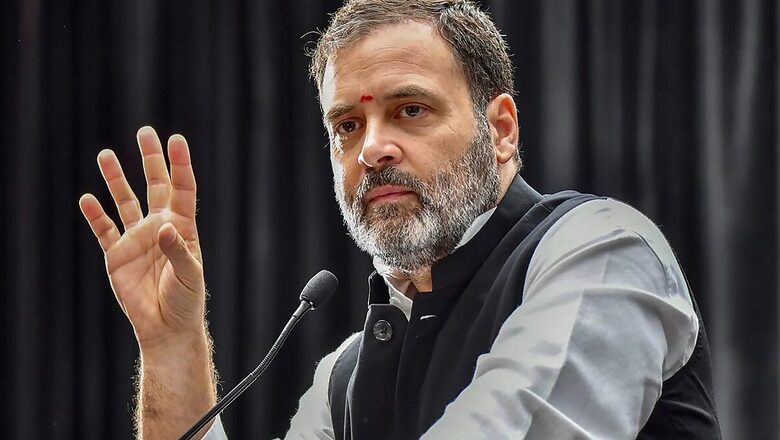
views
The Indian National Congress (INC), which was instrumental in the Independence movement, has today been reduced to a ‘two-digit’ party after having ruled for over six decades. The rise of Narendra Modi has changed the political discourse of the country as people have started realising they were cheated by the Congress in the name of secularism. The meaning of secularism nowadays has become abusing the cultural and historical ethos of the majority Hindu community. On the other hand, the Congress is yet to learn a lesson from its reduction to 52 seats in the Lok Sabha where it used to have 421 MPs. Its top leader, Rahul Gandhi, has yet again blundered — and that too in a foreign land — to describe the Muslim League as a “secular” party.
Let’s dive into history to see what similarities exist between Mohammed Ali Jinnah’s Muslim League and Kerala’s Muslim League. Jinnah had two juniors in South India: B Pokar Sahib Bahadur and M Mohammad Ismail. Both of them oversaw the activities of Jinnah’s Muslim League in South India under his guidance. The Muslim League had a significant triumph in Madras Province (present-day Tamil Nadu, Kerala, Karnataka, and Andhra Pradesh) in the 1945-46 elections. It gained all 28 Muslim-reserved seats in Madras Presidency, whereas the Constituent Assembly, also known as the Central Assembly, where three seats were designated for Muslims, the Muslim League won all three.
If you believe that following the country’s split, these Jinnah devotees must have gone to Pakistan, you are mistaken. They not only stayed in India after partition, but they also re-joined Jinnah’s Muslim League and resurrected it in India. On March 10, 1948, just seven months after Independence, M Mohammad Ismail and B Pokar convened a conference of Muslim League leaders. This gathering was held in Madras’ Rajaji Hall and was attended by all the major leaders of the Muslim League who did not travel to Pakistan after Partition but were planning to sow the seeds of enmity once more by remaining in India. Jinnah’s Muslim League gave birth to the Muslim League of Kerala, which was fostered and strengthened after Independence by Jinnah’s disciples. It is strange that people who call themselves the builders of secularism have not asked why there is a Muslim League in our nation.
Interestingly, after India was divided, these people in South India stayed back to further strengthen the ‘Ghazwa-e-Hind.’ On March 10, 1948, the Muslim League was re-formed in India to carry out this purpose and was renamed the Indian Union Muslim League (IUML). M Mohammad Ismail was elected as the country’s first president and was given the title Quaid-e-Millat, which means “leader of the country.” Just 12 days after Independence, on August 27, 1947, at the key sitting of the Constituent Assembly, Kerala Muslim League leaders B Pokar and M Mohammad Ismail, together with the rest of the Muslim League members, boldly put up a violently sectarian demand. Both asked that there be distinct designated seats for Muslims in elections throughout the country in which only Muslim candidates stand and vote.
B Pokar, a disciple of Jinnah, was again elected to the Lok Sabha from Malappuram in Kerala in 1952 and Manjeri in Kerala in 1957. Jinnah’s second disciple, M Mohammad Ismail, was not far behind. He served in the Rajya Sabha from 1952 to 1958 after becoming a member of the Constituent Assembly. Following that, he was elected to three successive terms from Kerala’s Manjeri seat in 1962, 1967, and 1971.
When the Hindu Marriage Act was being debated in 1954, there was a demand to bring a Muslim Marriage Act for Muslims as well. If the demand had been met, a law against triple talaq would have been made at the same time. Jawaharlal Nehru did not allow this to happen. MP M Mohammad Ismail, on December 11, 1954, during the discussion on the Hindu Marriage Act in the Rajya Sabha stated, “The Nehru government respected the sentiments of the country’s Muslim communities and kept them out of this marriage act.” Since then, this viewpoint is still maintained by many extremists today. “Based on our faith, we Muslims have our own set of regulations. This rule is an essential aspect of our faith, and we regard it as the most holy and valuable item in our lives,” he had said.
The Muslim League of Kerala has many times joined the Congress and occasionally, the Communist party. Those who see Nehru as the saviour of secularism must know that he spent his whole life deriding the Jana Sangh and the RSS. But one thing which the liberals fail to mention is that Nehru shared power with the Muslim League in 1960. The Congress won elections in Kerala and KM Sithi, who was formerly close to Jinnah, was appointed Speaker of the Kerala Legislative Assembly. Imagine that the head of the party that split the country 13 years ago was made the Speaker of a State Legislative Assembly.
With Congress backing, Muslim League leader CH Mohammed Koya became Chief Minister of Kerala in 1979. But, even after becoming the CM, Koya’s thinking remained unchanged. He continued to advocate Muslim extremist ideas, as evidenced by one of his interviews on November 30, 1979, with the India Today magazine. “The communal organisation of the minority and the communal organisation of the majority are different. We minorities unite to protect our rights and security, but the majority can collect rights anyhow, so why do they need communal organisations?” he had said.
Today, this organisation is believed to be indulging in forced conversions, the radicalisation of Muslim youth, and promoting radical Islam in Kerala and other parts of the country. Many young converted Muslim girls and boys are believed to have gone to join the ISIS and Taliban in Afghanistan, Syria and Yemen. Organisations like the Muslim League are believed to be responsible for it, but a leader of the Opposition party still calls them secular in the US. Such validation is basically done to garner international accreditation for such organisations.
Rahul Gandhi should rethink his strategy if he wants to win the 2024 Lok Sabha elections. He should know that such tricks will not work anymore.
Gopal Goswami is a social thinker & researcher and tweets with @igopalgoswami. Views expressed are personal.















Comments
0 comment